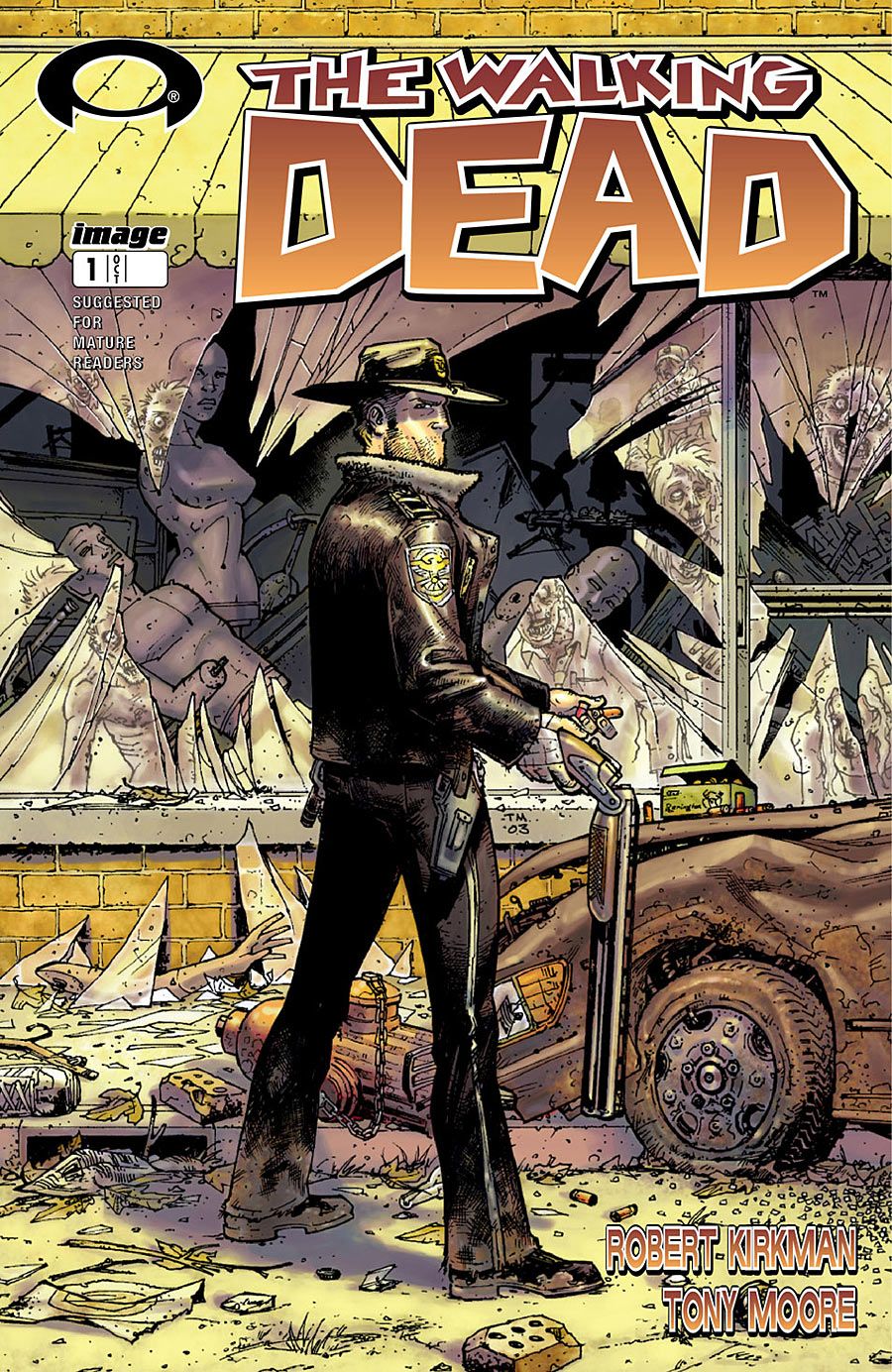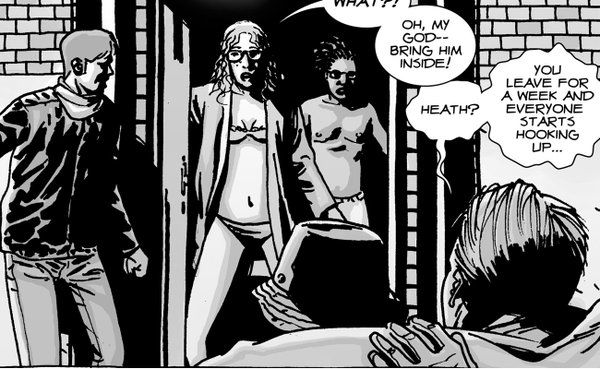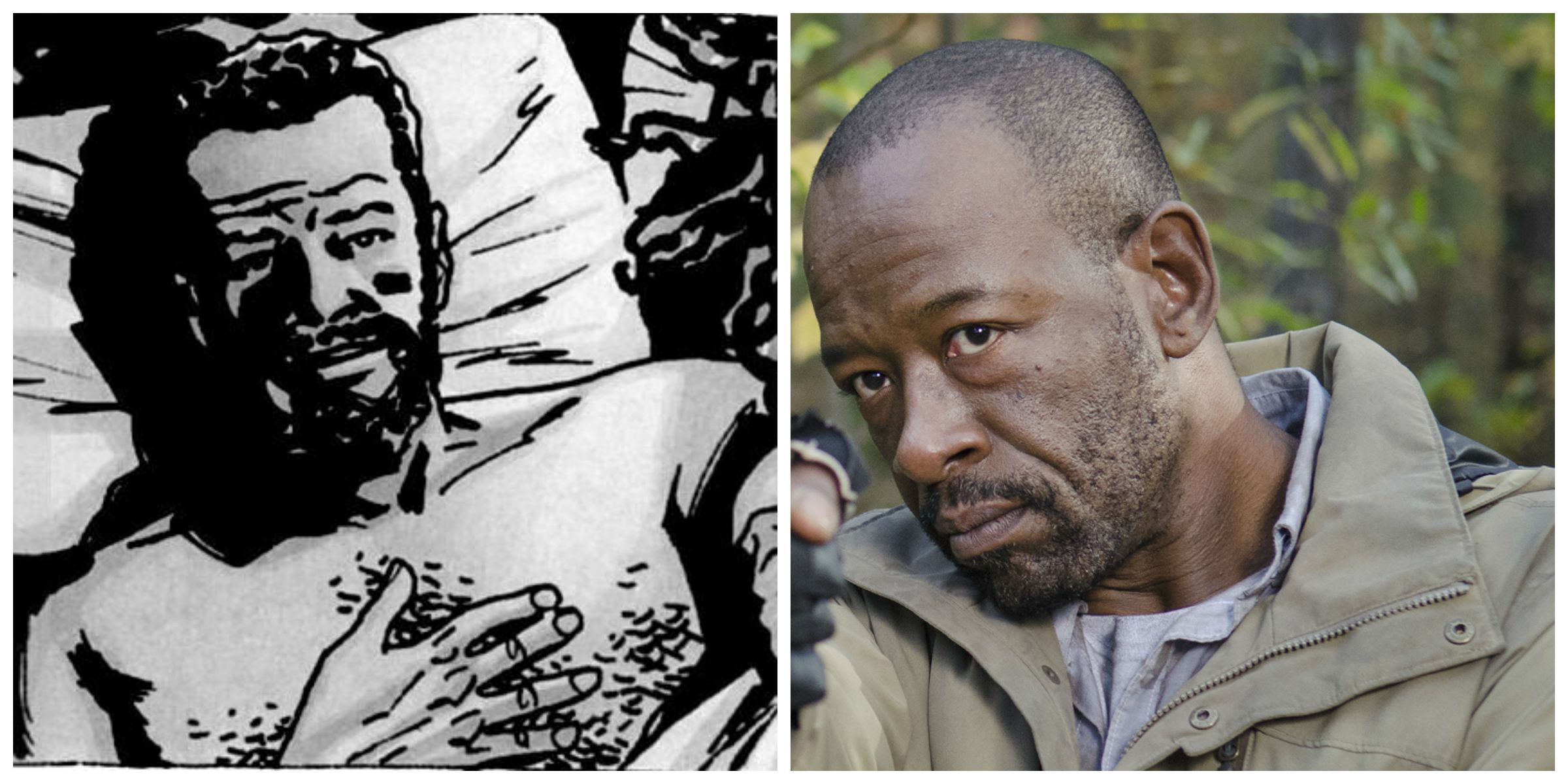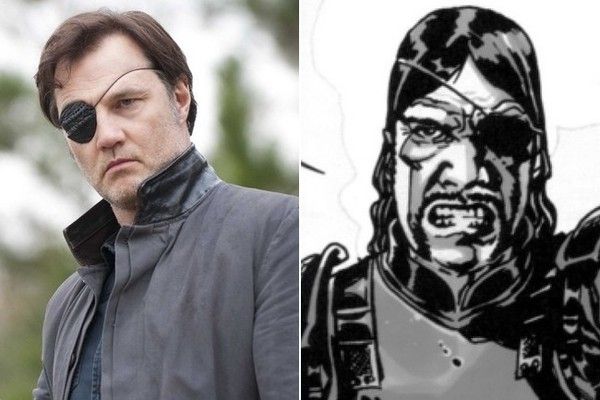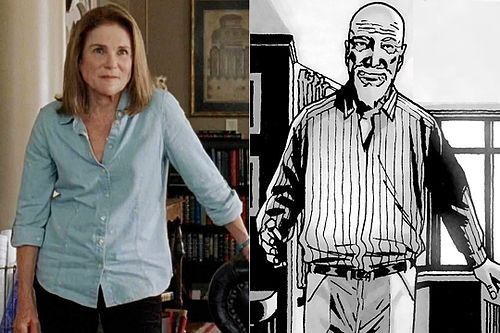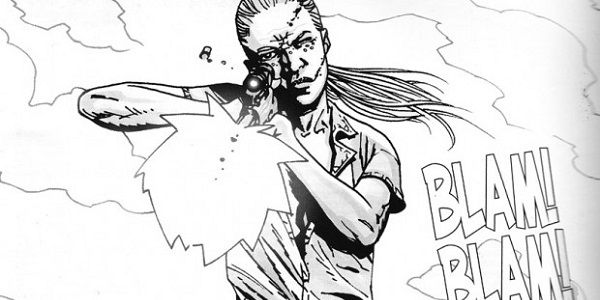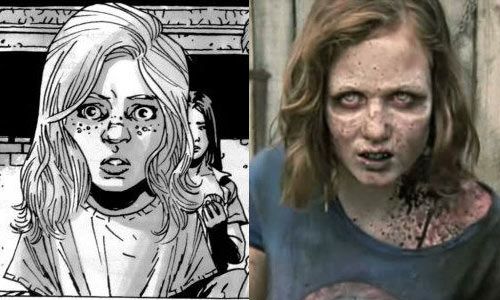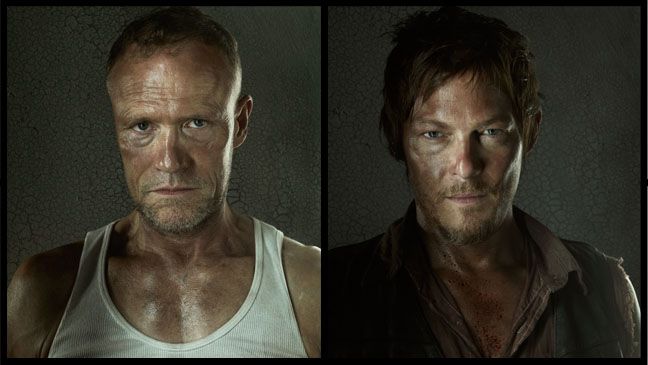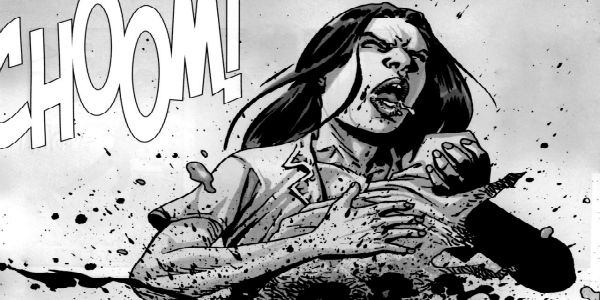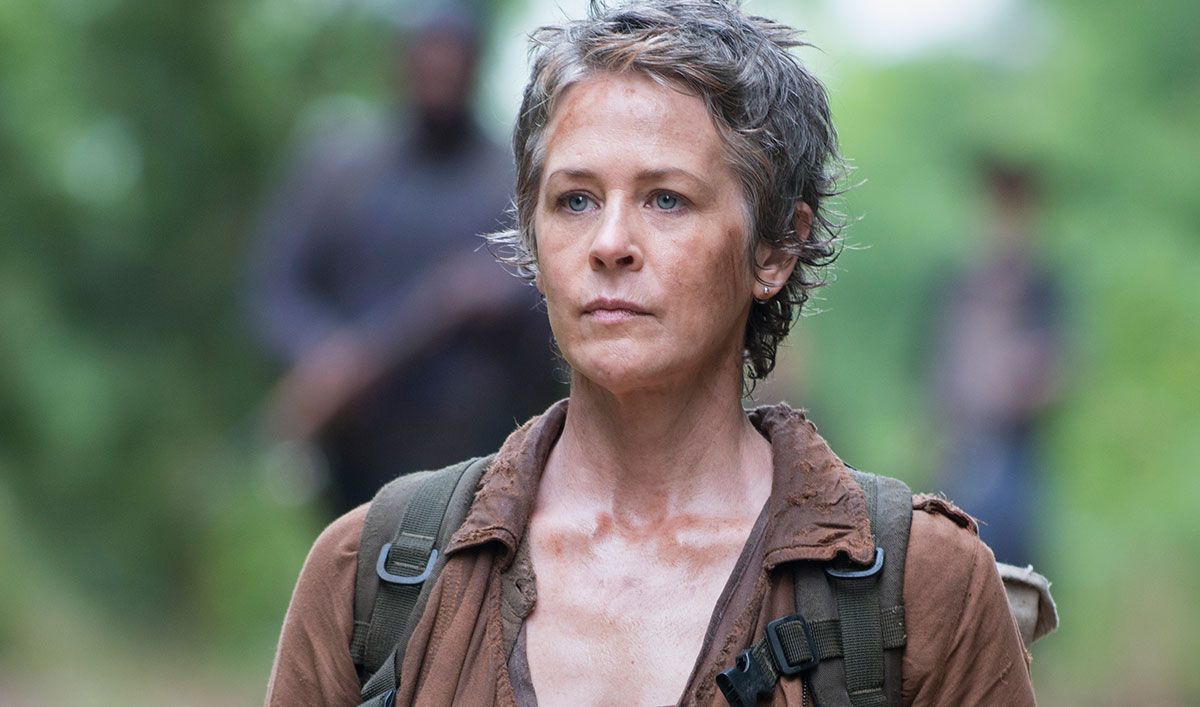SPOILER WARNING: Major spoilers from AMC's "The Walking Dead" (and the Image Comics series it's adapted from) follow.
10 Rick keeps both hands
Rick's right hand saw its fair share of battle in "The Walking Dead" comic. First, Rick mangled it while beating the snot out of serial killer Thomas after witnessing him try to murder Andrea. Who knows what would have happened if Tyreese hadn't stopped him from taking the murderer's life -- his hand could have been damaged beyond repair. Not that it mattered in the long run. The Governor would eventually hack it off with a machete when meeting Rick and trying to get him to reveal the location of the prison (it didn't work).
So far, the show has kept both of Rick's paws intact, despite some superficial injuries here and there (he most recently sliced it open while scuffling with a walker in "Thank You"). While it's very possible that he could lose his hand in the future, "Walking Dead" creator Robert Kirkman has also expressed regret at making the move in the comics, as it's presented a ton of logistical challenges when writing. And let's face it, the show already has enough to worry about in the upcoming seventh season.
9 Denise's romance with Tara
There are certainly more strong LGBTQ characters on television today than there were 20 or even 10 years ago, but there's still a long way to go in terms of equal representation onscreen. So kudos to "The Walking Dead" writers for changing Denise Cloyd's attraction to Heath to an attraction to Tara on the show. Their romance was cut rather short, however, thanks to Dwight accidentally sending an arrow through her eye this past season.
Although Denise does eventually die much later in the comics, her demise on the series drew a fair amount of criticism for reinforcing the TV trope known as "Bury Your Gays" or "Dead Lesbian Syndrome." Making things worse was the fact that her death was originally meted out to Abraham, a character who (as far as we know) remains alive on the show. When reviewing her death episode, "Twice As Far," I expected her departure would be significant in the grand scheme of things, especially since it increased the threat of Negan and The Saviors. But since that storyline landed with a thud at the end of Season Six, Denise now feels like another straw man they simply wanted to get out of the way.
8 Morgan survives (for now)
As old as Morgan and Carol's debating got in Season Six, we're glad he's still alive. It's allowed "The Walking Dead" to further explore the nuances and challenges of the more peaceful worldview he's adopted in the wake of the zombie apocalypse. It also gave us standalone episodes like "Here's Not Here;" somewhat satellite to the main arc of the show, but rich in character development and quiet storytelling.
In the comic though, Morgan's time was cut much shorter. Dying similarly to how Tyreese does on the AMC series, he gets bitten in the arm by a walker, which prompts Michonne to sever the limb with her katana. He ends up passing away from blood loss, making sure to plead for some of the other characters not to give in to the darker sides of their personalities before he goes. That's still in line with his overall philosophy on the show, but it feels a lot more rushed and nowhere near as resonant.
7 The Governor's look and personality
While The Governor was always a threatening presence in the comic, his look and demeanor would have been somewhat difficult to pull off on the show. The two versions are ostensibly the same person as far as the plot goes -- the guy in the book just happens to be more cartoonish. Would we have really been able to take The Governor seriously onscreen if he looked and talked like a villain in one of the "Machete" movies? Probably not. The show smartly got rid of the mustache and long hair, toned down his aggression in favor of a more brooding sensibility, and expanded his backstory. Sure, the Woodbury business grew clunky at times, but the community was now led by someone whose charisma and supposed rationality (which proved to be false) made a good case for how he could be trusted as a leader. That's an essential component for any villain who rises to power.
6 Douglas Monroe becomes Deanna Monroe
Douglas Monroe and Deanna Monroe are, for all intents and purposes, the same person: the well-intentioned but cowardly leader of Alexandria. Both characters are kind and have good ideas on how to run a community, but at the same time, crumble whenever they get too close to violence. One of the few differences between the two is that Deanna gets a late-in-the-game redemption, eventually siding with Rick, realizing that sometimes violence is required, and dying on her own terms (Douglas gets killed while holed up in his house, prepared to kill himself).
The big takeaway from this is that, if you swap a character's gender, it usually doesn't have a negative impact on the story. Casting the Douglas role on the show as a woman simply made for a more diverse ensemble, and thus more interesting storytelling. "The Walking Dead" should do it more often.
5 Andrea dies
We've already gone over why killing Andrea maybe wasn't the best decision in our breakdown of the show's 10 Most Important Deaths, but it still bears repeating. Just look at all she went on to do in the comics: her marksmanship skills made her an invaluable asset in the war against Negan, she became a prominent leader in the new Alexandria Safe Zone, and eventually became a romantic partner to Rick, with Carl calling her "Mom." It looks like a lot of these plot points will be folded into Michonne on the show, and to be fair, it's not like the AMC series has a dearth of strong female characters. But there's no denying that Andrea's death is a huge divergence from the comic that still stings just a little for its wasted potential.
4 Sophia dies
Unlike Andrea, the death of Sophia actually benefited the TV show, as it had a very specific purpose. As we noted in our 10 Most Important Deaths list (that's the last time we'll reference it, we promise), it showed that "The Walking Dead" wasn't going to be playing by conventional storytelling rules. It showed that, in the world of a zombie apocalypse, hard decisions often have to be made. And most importantly, it showed that no one on the TV series is safe. Sure, Sophia ends up having a substantial arc in the comic that continues to this day, bonding closely with Carl and -- along with him, Rick, and Andrea -- living to become one of the last original survivors from Atlanta. But her death on the show makes complete sense; not every premature demise on "The Walking Dead" is unjustified.
3 Daryl and Merle Dixon
The TV adaptation of "The Walking Dead" has added major characters here and there. Some of them, like T-Dog, have proven to be relatively inconsequential. Seriously, does anyone even mention him anymore? Others, however, have gone on to become some of the most popular roles on the series, most notably Daryl Dixon. Even if he ends up biting the dust in Season Seven premiere, Norman Reedus can leave the show knowing that his journey has been human and complex, allowing him to develop Daryl's gruff survivalist exterior while also exploring the loyalty and vulnerability underneath. From Rick to Carol, no one seems to have a superficial relationship with him. Despite his stereotypically redneck appearance when we first met him back in Season One, the dude's emotions run deep.
The same can't be said for his brother Merle. Not quite. While Michael Rooker was always a pleasure to watch in the role (is Rooker ever not a pleasure to watch?), the part was often relegated to a racist, misogynist cliche. And when the show did try to give him more humanity during the Woodbury arc, he had been absent so long that his change of heart didn't feel earned. Even if Merle did add a considerable number of people to Rooker's fanbase (his autograph lines at conventions continue to be massive), it's blatantly clear which character has worked better within the series' storyline. Thus, the Dixon brothers are perfect examples of both the rewards and the pitfalls that come with adding characters to an already established narrative.
2 Judith survives (for now)
Seeing baby Judith explode while cradled in her mother's arms has always felt so, so cruel in "The Walking Dead" comic. Effective and necessary to the story and Rick's arc, but cruel nonetheless.
Could it have worked on the show? Could it still work on the show? It's hard to say. "The Walking Dead" remains one of the most violent programs on TV, but there's a big difference between seeing an exploding baby in a still frame on the page and seeing it played out in full motion onscreen. Even if handled with subtlety (is that even possible?), there's still the danger that it would have come off as exploitative or sensationalistic. The showrunners were probably wise to remove it. After all, they were able to keep Rick's descent into mental instability intact by still having Lori die in the prison. Keeping Judith alive also gives the show's protagonist more to fight for. Since his daughter's much younger than Carl and has virtually no self-reliance, she becomes a tiny beacon of hope that prevents Rick from going full-on villain -- a stage he's ventured dangerously close to in recent seasons.
1 Carol survives (for now)
Simply put, TV Carol rules. Executive producer Scott M. Gimple has described her arc as a "hero's journey," and for good reason. No character has had to grow as much as Carol. No character has had to make so many hard decisions. And no character save for Morgan has fought against their hardened instincts as much as she has. She's had to do some awful, awful things, but at the end of the day, she still wants a simple life. She still wants a home. She still wants to hold on to her humanity. But none of that changes what a badass she is.
Thank God the "Walking Dead" writers went this route with Carol instead of making her too similar to her role in the source material. There, Carol was fairly unstable and weak from the beginning, desperate for love and companionship. After a brief fling with Tyreese, she eventually snapped when he cheated on her with Michonne. She frantically searched for companionship elsewhere, even asking Rick and Lori if they'd be interested in entering a polyamorous relationship with her (they declined). Shortly afterward, she committed suicide.
While all of this is believable -- many folks would certainly become unhinged and needy in a post-apocalyptic world -- it also lays on the tragedy a little too thick. Terrible shit happens all the time in the "Walking Dead" universe, so isn't it more interesting to see a character prevail against darkness rather than succumb to it? That makes the show's version of Carol the smartest adaptation change the writers have ever made. Like millions of other fans, we hope she makes it to the very end, and according to Robert Kirkman, she will.
What change to "The Walking Dead" most benefited the show? Which one hurt it?


